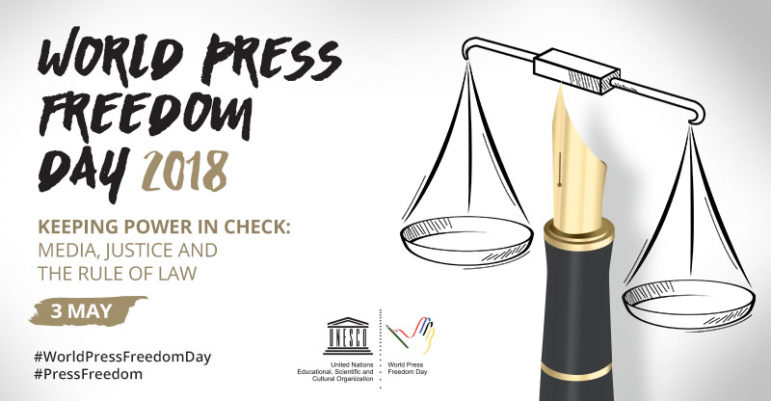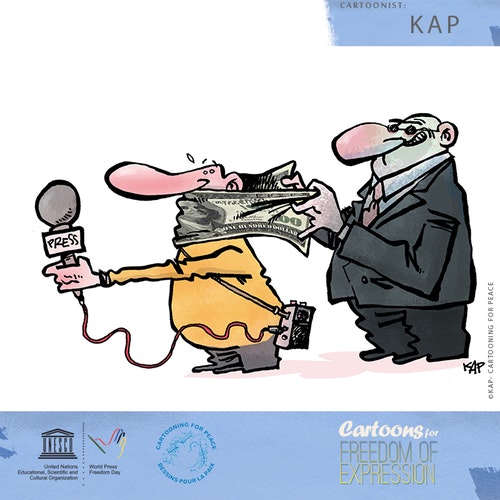 At a time when the news media is under unprecedented attack, and the need for watchdog reporting has never been greater, we hope you will join GIJN today in marking World Press Freedom Day (#WorldPressFreedomDay). This is the 25th celebration of WPFD, but despite the years of meetings and proclamations by its sponsors UNESCO and others, conditions are getting worse, not better, for journalists around the world.
At a time when the news media is under unprecedented attack, and the need for watchdog reporting has never been greater, we hope you will join GIJN today in marking World Press Freedom Day (#WorldPressFreedomDay). This is the 25th celebration of WPFD, but despite the years of meetings and proclamations by its sponsors UNESCO and others, conditions are getting worse, not better, for journalists around the world.
 This year’s WPFD theme is “Keeping Power in Check: Media, Justice and The Rule of Law,” a fitting topic for a time when the rule of law is failing in much of the world, censors rule the airwaves, and oligarchs seek “state capture” of major media.
This year’s WPFD theme is “Keeping Power in Check: Media, Justice and The Rule of Law,” a fitting topic for a time when the rule of law is failing in much of the world, censors rule the airwaves, and oligarchs seek “state capture” of major media.
Still, we’re not dead and finished — far from it. Seen from GIJN’s perspective, we have more journalists digging harder in more places with better tools than ever before. No wonder we’re under attack when autocrats find there’s a watchdog media exposing their offshore investments, wasteful spending, and abuses of power. This may explain the backlash we’re facing in so many countries — even those in which we thought we were relatively safe. Serious, watchdog reporting has spread far and wide, from Peru and Pakistan to Uganda and Ukraine.
Here’s a quick sampler of what’s happening with WPFD this week:
- More than 30 events are scheduled around the world, led by a UNESCO-sponsored conference in Acra, Ghana. On the schedule is announcement of the annual UNESCO/Guillermo Cano World Press Freedom Prize. Created in 1997, the award is named in honor of Guillermo Cano Isaza, a Colombian journalist assassinated in front of his newspaper El Espectador in Bogotá in 1986.

- Freedom of expression rapporteurs from major international bodies issued a “Joint Declaration on Media Independence and Diversity in the Digital Age.” The six-page document provides a robust defense of a free press, including support of freedom of information laws, an end to criminal libel, and the strict limiting of laws aimed at constraining or putting political pressure on digital communications and content. Among the signatories: The UN Special Rapporteur on Freedom of Opinion and Expression, the Organization for Security and Co-operation in Europe (OSCE) Representative on Freedom of the Media, the Organization of American States (OAS) Special Rapporteur on Freedom of Expression, and the African Commission on Human and Peoples’ Rights (ACHPR) Special Rapporteur on Freedom of Expression and Access to Information. Available in English, Arabic and Spanish.
- Danish filmmaker Tom Heinemann’s documentary, Courage: Journalism is Not a Crime, is being released today. The film looks at investigative journalists under attack around the world, and includes interviews with GIJN’s director and leaders of several of GIJN member organizations and partners.
- UNESCO released 25 Seconds for Press Freedom, a series of moving statements on video by renowned journalists, artists and press freedom advocates.
- In a public statement, UNESCO Director-General Audrey Azoulay noted: “Any state under the rule of law that respects individual freedoms, and particularly the freedoms of opinion, conscience and expression, relies on a free, independent press that is safe from censorship or coercion.” Let’s hope someone is listening.
- But perhaps Harlem Desir put it best. Mr. Desir was recently appointed Representative on Freedom of the Media for the Organization for Security and Cooperation in Europe. In a video to commemorate WPFD, Desir said simply: “There is no democracy without the free press, without investigative journalism and without safety of journalists.”

The 2018 World Press Freedom Index, compiled by Reporters Without Borders, finds “a climate of hatred” fueling growing hostility towards journalists — one “openly encouraged by political leaders.”

Investigative journalists in Bangladesh are subject to constant intimidation, harassment, and attack from politicians, bureaucrats, and security personnel. Journalists have become afraid of their lives and live in a contant insecured environment. They are harassed in various ways, including forcing the newspaper and television owners to sack them from jobs. In fact, journalists have no security in Bangladesh at all. In spite of it, thousands of freedom-loving people in Bangladesh have great faith in investigative journalists and consider them as the torch-bearers of democracy. In such a situation, the democracy and freedom loving people around the world should raise their voices in favour of journalists and journalism in Bangladesh.